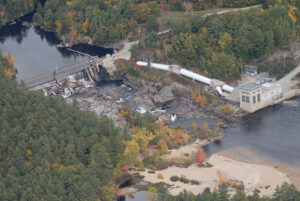Assessing the Value of Access to Water-Related Data to Support River Basin Management

Credit: Brookfield Renewable Energy Partners
Sponsor: U.S. Department of Energy through UC Irvine
New England Institutions: University of Maine, University of New Hampshire
Other Collaborators: Pacific Northwest National Lab, Stanford University, Oak Ridge National Lab, UC Berkeley, UC Irvine
In recent years there has been increasing awareness of the benefits of collaborative river basin planning efforts. Model examples in the United States include the Penobscot River Restoration Project in Maine, the Clark Fork Project in northern Idaho and northwest Montana, and Lower Yuba River Accord in California.
While these efforts were driven by local discussions and basin-specific motivations, they share several key characteristics, including a broad coalition of stakeholders, a basin-scale approach to river management, and final agreements predicated on mutual benefit. In addition, and importantly, informed decision-making in these basins required access to comprehensive data and information (“water data”) about key issues at all stages.
However, the water data that is needed to characterize river systems to support management activities are often disaggregated, duplicated among disparate sources, or not publicly available. Data may be collected and/or maintained by dozens of different federal and state agencies, as well as research and non-governmental organizations. As a result, substantial effort is often needed to identify, aggregate, clean, analyze and visualize information. These issues pose barriers to effective water management and can result in lost opportunities for collaborative basin-planning efforts.
In response to a growing recognition of this data access problem, the U.S. Department of Energy (DOE) Water Power Technologies Office (WPTO), initiated a project in October 2019 to investigate and document the value of improving the discovery, sharing, and use of water data for diverse stakeholder groups in a handful of different river basins. The first phase of this work (Oct. 2019 – Feb. 2020) characterized relevant categories of water data; described the current state of accessing, using, and visualizing water data; and identified target river basins where investigations could continue. Much of this was accomplished by soliciting input from various stakeholders at national, regional, and local levels on issues related to the types of data that are important in decision-making, challenges experienced accessing and using these data, and perceived need for a central source of water data. In the next project phase (Mar. 2020 – Dec. 2021), the team will further investigate how to better define different targeted users of data and their information needs, build a more in-depth understanding of related efforts, and demonstrate the value of a data aggregation effort to build support for potential future work. These investigations will occur in three regions of the U.S.: New England, Wisconsin, and northern California.
New England Basin Research
New England is home to more than 200 FERC-licensed hydropower projects, more than 80 of which are due for relicensing in the next five years. The need for decisions that balance multiple social, environmental, and energy objectives of stakeholders, combined with the practical challenges of aggregating data to better inform these decisions, has made New England a model example of the benefits of collaborative river basin planning efforts. Examples include removal of the Edwards Dam in 1999 followed over a decade later by the Penobscot River Restoration Project. These examples demonstrate practical collaborative opportunities for seeking a balance between various social, environmental, and energy goals in a river basin.
The New England team is developing a data story to demonstrate the benefits of basin-scale decisions, the potential for further opportunities in New England and beyond, and the importance of large aggregated datasets for informing and overcoming these challenging decisions. The tools being developed are responsive to needs expressed by basin partners. The team is planning an iterative approach to data story development, with continued communications among basin partners to identify crucial data and data visualization needs for decision support. They envision a user-friendly online platform to enhance understanding of potential social, environmental, and energy trade-offs caused by dam decisions, such as removing or refurbishing a dam or hydropower project, made possible using multi-objective optimization models and a comprehensive set of geospatial and temporal basin-level data.
The team is exploring the range of potential benefits of decision coordination in two contrasting case studies: the Penobscot and Connecticut River basins. The environmental and infrastructural differences between these basins help to demonstrate the value of aggregated, visualized, and freely accessible data to aid in enriched and engaged decision-making around hydropower and other important river-derived resources under variable conditions and across spatial scales. Coordinated dam management practices within and across these basins could lead to opportunities for greater power production and fewer environmental impacts than if dams are managed independently. The team expects the potential for these opportunities to differ significantly between basins, therefore cross-basin comparisons will be a crucial feature of the data story.
Team Members:
University of Maine
University of New Hampshire
- Weiwei Mo
- Cuihong Song
Stanford University
- Dan Reicher
- Makena Wong
- Jack Seagrist
- Rahul Dhakal
Pacific Northwest National Lab
Oak Ridge National Lab
- Debjani Singh
